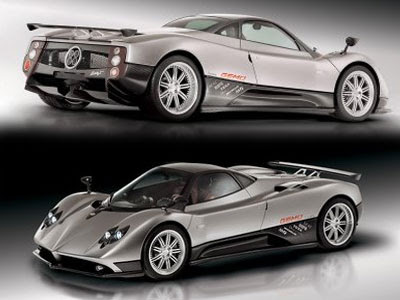The Pagani Zonda R Clubsport - 220 mph (354 km/h) is very unique in its own right but has some tail, tail, signs of other super cars on this page, see if you can spot them. This is a very, very rapidly fast car
The central carbon chassis incorporates a roll cage and a rubber racing fuel cell with 4 fuel pumps and quick refuel filler cap, similar to GT race cars. The wheelbase has been increased by 47 mm (1.9 in) to increase stability. The front and rear subframes are brand-new, built to accommodate new suspension geometry, and produced in Avional. The slick-shod wheels are new forged-magnesium centre-lock models, which in conjunction with on-board pneumatic airjacks (again, like the FXX) allow rapid change of the entire wheel assemblies.
The car senses, displays and logs information about the amount of downforce that is generated at each wheel at all times. It is thought that this system will enable owners to adjust set-up ccording to track conditions and to improve their cornering technique.
Bodywork In addition to the wheelbase increase (47 mm), overall length has increased by 394 mm (15.5 in) and track by 50 mm (2 in). The bodywork and aerodynamics have been altered to offer maximum downforce, featuring a longer front bonnet with flaps, a closed underbody and a new rear overhang with adjustable rear wing and race-derived diffuser. These are intended to translate into increased aerodynamic efficiency and downforce for maximum cornering speed. It is also noted that the car's new rear bodywork is minimal in the extreme, being composed mostly of vent. This is thought to be symptomatic of the need to keep the engine cool enough, even under hard track use. Again, this is similar to the gutted bodywork of the Ferrari Evoluzione.
Engine Output has increased to 750 bhp (559 kW) at 8000 rpm and 523 lb·ft (709 N·m) of torque. A lightweight carbon fibre high performance intake system, racing multiple disc sintered clutch and Formula 1-style exhaust system, hydroformed in Inconel 625 and ceramic coated for optimal heat dissipation, have been added. The engine is combined with a 6-speed transverse-mounted manual sequential synchronized gearb
Interior The car's interior is spartan reflecting the car's racetrack aspirations and intended home, and features bespoke seats, customized to the driver to offer maximum support. As before, the Digitek instrumentation provides essential information and the sophisticated telemetry allows a variety of sensors to monitor numerous aspects of the car.
Bodywork In addition to the wheelbase increase (47 mm), overall length has increased by 394 mm (15.5 in) and track by 50 mm (2 in). The bodywork and aerodynamics have been altered to offer maximum downforce, featuring a longer front bonnet with flaps, a closed underbody and a new rear overhang with adjustable rear wing and race-derived diffuser. These are intended to translate into increased aerodynamic efficiency and downforce for maximum cornering speed. It is also noted that the car's new rear bodywork is minimal in the extreme, being composed mostly of vent. This is thought to be symptomatic of the need to keep the engine cool enough, even under hard track use. Again, this is similar to the gutted bodywork of the Ferrari Evoluzione.
Engine Output has increased to 750 bhp (559 kW) at 8000 rpm and 523 lb·ft (709 N·m) of torque. A lightweight carbon fibre high performance intake system, racing multiple disc sintered clutch and Formula 1-style exhaust system, hydroformed in Inconel 625 and ceramic coated for optimal heat dissipation, have been added. The engine is combined with a 6-speed transverse-mounted manual sequential synchronized gearb
Interior The car's interior is spartan reflecting the car's racetrack aspirations and intended home, and features bespoke seats, customized to the driver to offer maximum support. As before, the Digitek instrumentation provides essential information and the sophisticated telemetry allows a variety of sensors to monitor numerous aspects of the car.
Visit jeff surriname for Daily Updated Hairstyles Collection









